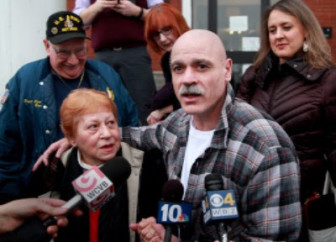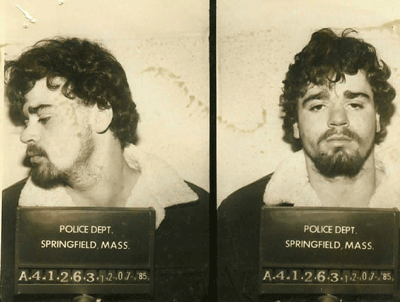
Photo by Jonathan Wiggs, Boston Globe
George Perrot escorts his mother, Beverly Garrant, out of the courthouse. on Wednesday.
Judge denied Hampden, Mass., DA’s request to keep Perrot in prison while deciding whether to appeal the decision or retry Perrot.
The Schuster Institute for Investigative Journalism, based at Brandeis University, began investigating Perrot’s claim of innocence in 2011 after he said he hadn’t received responses from any of the many organizations he had written to asking for help.
The following is a comprehensive news release detailing Perrot’s story:
NEW BEDFORD, Mass. — Thirty years into a life sentence for a rape conviction that was overturned Jan. 26, George D. Perrot was set free on his own recognizance on Wednesday at a bail hearing at Bristol County Superior Court in New Bedford.
Perrot, 48, wiped tears from his eyes several times as Judge Robert J. Kane read his decision aloud.
“I determine that a bail of personal recognizance satisfies the test of common sense,” Kane said.
Hampden County prosecutors argued that Perrot was a flight risk and a danger to public safety. Prosecutor Elizabeth Dunphy Farris requested that Perrot be held without bail, or alternatively on $100,000 cash bail or $1 million surety, with a GPS monitor and a curfew.
Kane said that while the Commonwealth has the right to appeal, he was “confident” that his decision could not be appealed successfully, and that Hampden County prosecutors could not secure a conviction if they were to try Perrot again.
In his decision overturning the conviction, Judge Kane wrote that “justice may not have been done,” and cited newly available evidence that the testimony of FBI hair analyst Wayne Oakes in Perrot’s trial was not supported by science and should not have been admitted.
“It is not a close call,” Kane wrote. Without the FBI hair analyst’s testimony, it was unlikely that Perrot would have been convicted, he wrote. Experts believe Kane’s groundbreaking ruling marks the first time a U.S. court has made a decision based solely on the unreliability of microscopic hair analysts’ testimony that went beyond the limits of science, and is expected to influence jurists across the country looking at similar cases.
Judge Kane also said today that he had confidence that Perrot has the support he needs to adjust and successfully reenter society.
“George Perrot has the good fortune to have many committed and talented people working for his success,” Kane read from his decision to release Perrot. “That community of friends and advisors have assembled a strong support network for his successful transition, which will surely be demanding.
“Ultimately, it will be up to George Perrot,” Kane said, looking directly at Perrot. “It is he who will need to prepare himself for the confounding difficulties that lay in front of him. It is he who needs to develop the will and discipline to refrain from the call of impulse.”
Kane said that after a “rigorous review” he is “reasonably sure that George Perrot did not physically or sexually assault Mary Prekop,” the 78-year-old victim who, despite pressure from police and prosecutors, never wavered from saying that Perrot did not meet the description of her attacker.
“It was Mary Prekop who possessed the human integrity to refrain from joining the movement to say it was George Perrot who physically and sexually assaulted her,” Kane said, telling Perrot that he would be “in her debt forevermore.”
After Perrot’s shackles were removed and he changed into street clothes, he spoke briefly to reporters.
“It really hasn’t sunk in yet. I want to spend some time with my mom,” Perrot said. Gently taking his mother by the arm, he said, “Let’s get out of here, Mommy.”
Perrot left the courthouse with his mother, stepfather and a friend, on his way to a steak dinner, said his mother, Beverly Garrant, 76. “I’m just so happy. He’s got another chance to live his life and start over again,” she said.
The Schuster Institute began investigating Perrot’s claim of innocence in 2011 after he said he hadn’t received responses from any of the many organizations he had written to asking for help.
Judge Kane vacated Perrot’s convictions related to a 1985 Springfield break-in and rape.
Perrot has spent the past 30 years in Massachusetts prisons serving two concurrent life sentences for the crime, which he consistently maintained he did not commit.
“We are deeply grateful that Judge Kane clearly recognized in his landmark decision and today when he freed him that George Perrot was not given a fair trial and that his conviction had been improperly tainted by a prosecutor (Francis Bloom) who couldn’t separate his personal animus towards Perrot from his professional legal responsibilities,” says Florence Graves, founding director of the Schuster Institute for Investigative Journalism at Brandeis.
“Moreover, George’s treatment by the Commonwealth over the past 30 years he has been in prison is beyond what any human being should have had to endure,” she said.
“What’s remarkable is that somehow George found the internal strength over those three decades to fight for his freedom, repeatedly trying to use the legal system that had betrayed him, even though at almost every turn, his legal pleas were denied, and he was treated with disrespect,” Graves said.
What’s next
Prosecutors have 30 days from Jan. 26 to file an appeal of the decision overturning the case. If the Commonwealth decides instead to retry Perrot, a trial must begin within a year after the order for retrial was finalized.
Perrot plans to live in Massachusetts while he awaits a decision from prosecutors about the future of his case.
“‘How could this have possibly happened?’ everyone asks me once they know George’s story,” Graves said. “I have asked the same question countless times over the past five years since the Schuster Institute began investigating George’s case. And despite all of our reporting, I still don’t fully know. That’s because so much information has not been made publicly available by officials in Hampden County, where George was convicted.
“Nevertheless, both George and the citizens of Massachusetts deserve the answer from our public officials. And this will take subpoena power and a thorough investigation of those in positions of power over George Perrot for the past three decades, starting with those in Hampden County,” she said.
Details of the case
Perrot was convicted twice for the Nov. 30, 1985 break-in and rape of a 78-year-old woman in Springfield, Massachusetts, one of several similar crimes that had occurred over the past year and a half in the city. The victim did not identify Perrot from a lineup, and testified in both trials that Perrot, who had grown up in her neighborhood, was not the man who attacked her.
At trial, prosecutors presented what turned out to be problematic and inconclusive hair and blood evidence, as well as a confession to the break-in — but not the rape. Perrot, who was under the influence of alcohol and Valium at the time of his arrest, told the Schuster Institute he has no memory of signing the document? and that he did not break into the victim’s home?.
Perrot was 17 when he was arrested and 19 when he was first convicted, in 1987. Prosecutors’ admission of improperly obtained evidence and prosecutorial misconduct contributed to the reversals of his first and second trials, respectively. An appeals court reinstated his second conviction in 2003. He has served 30 years of two concurrent life sentences, one for aggravated rape and the other for burglary and assault on an adult.
The microscopic hair analysis that was instrumental to Perrot’s conviction was phased out at the FBI by 2000, in favor of the more definitive, scientifically based DNA hair testing. Before then, FBI agents trained as microscopic hair analysts (who compared hairs under a microscope) testified as experts, often beyond the limits of science, in thousands of criminal cases across the United States.
Many of these cases are now being called into question by a historic review that has identified several thousand cases in which FBI examiners may have testified beyond the limits of science. The review is being conducted jointly by the FBI, the National Association of Criminal Defense Lawyers and the Innocence Project.
Perrot is represented by lead counsel Kirsten Mayer, Ropes & Gray (Boston), and co-counsel Nicholas Perros, Ropes & Gray (Washington, D.C.); Christopher Walsh, Ropes & Gray (Boston); Lisa Kavanaugh, director of the Massachusetts Committee for Public Counsel Services Innocence Program; and Chris Fabricant, director of strategic litigation for the Innocence Project.
Assistant District Attorney Katherine McMahon and Elizabeth Dunphy Farris, legal counsel to the district attorney, represent the Commonwealth.
Media Contact: Tate Herbert, 617-775-6926, 781-736-3873, herbertt@brandeis.edu
FOR MORE INFORMATION: Case timeline, court documents, video of evidentiary hearings and more information about the case are available at brandeis.edu/investigate.
About the Schuster Institute for Investigative Journalism
The Schuster Institute for Investigative Journalism is an independent nonprofit news organization based at Brandeis University that focuses on investigating social justice and human rights abuses. To learn more about how to support efforts like these or to get more involved, please visit our websites, brandeis.edu/investigate and WeInvestigate.org, or email schusterinstitute@brandeis.edu





